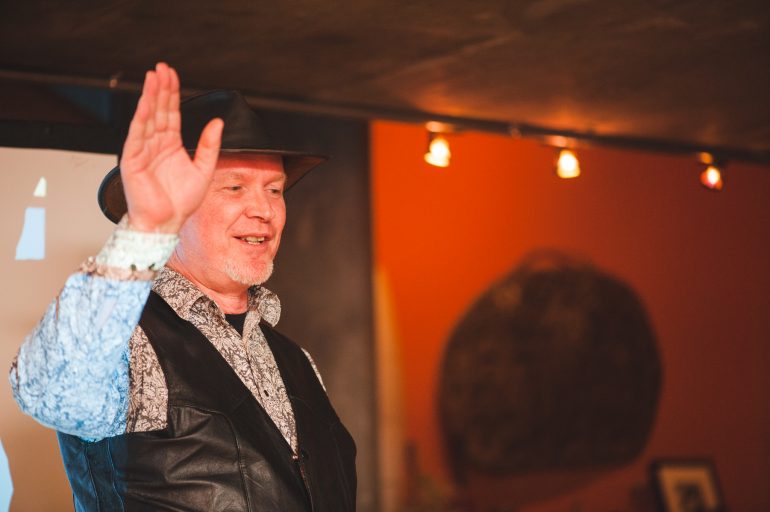OpenMedia.ca recently invited a group of people from Vancouver’s technology, philanthropy, and social enterprise community to join an evening conversation entitled, “Propelling our Connected Future Forward.”
The community-based organization is focused on safeguarding the possibilities of the open Internet. They’re creating informed and participatory digital policy by engaging hundreds of thousands of people in protecting our online rights. They support transparent and participatory processes for making Internet policy based on five basic principles set out in the Declaration of Internet Freedom.
Read Also: Canadian Indentity-Privacy Pioneer Austin Hill Has a Message for the Founders of Whisper and Secret
Michael Tippett (co-founder of NowPublic, now director of new product for HootSuite) and Tim Bray (former developer advocate for Google, cofounder of Open Text Corporation and Antarctica Systems) lead the conversation.
Tippett was very clear about his reasoning for being part of the evening. Thinking back to the late ‘90’s and being part of one of Canada’s first digital agencies Tippett said, “I’m part of this GenX malaise, thinking life is gloomy and we’re going to be worse off than our parents. A real bummer. And then the internet came, and it was like we’re saved!”
The early internet days were seen as a kind of utopian vision. It represented an open, free, democratic, and revolutionary force. Tippett added, “it changed a lot of lives, my life, and is now changing my kids’ lives. The reality is that those heady days are behind us, and that original vision is under threat. A great internet is more than just having fast download speeds for a better Netflix experience, it’s about ensuring we have an open, free, and democratic society.”
Bray said “there’s a lot of things we need to do to make sure the internet stays open. We have to worry a lot about things like net neutrality, pricing, and bandwidth. The one thing that worries me most of all is privacy. You can’t have an open internet unless you can close down parts of it, namely the parts you don’t want to share with everyone else in the world.
Having private by default internet, one which can be truly open and people can be themselves without fear doesn’t have to be a utopian vision. Ultimately, there needs to be a counter position to those who think, “if you’re not doing anything wrong, why do you need privacy anyhow.” Wanting privacy isn’t about having nefarious intentions.
According to Bray, “it’s ok to be pro-privacy without being a crook, pervert, or terrorist.”
The people who are spying on us on behalf of your government are just people. Most are well-meaning, underpaid, dedicated public servants who passionately believe they are protecting you and me from bad guys who want to do terrible things. However, a small proportion of them are inevitably stupid, insane, corrupt or just crazy. People who are in that position with that much access to information can wreak havoc on your life in a lot of different ways. Thus it needs to be regulated, watched, and the amount of snooping needs to be minimized. And there’s nothing wrong with asking for that.”
With the proliferation of mass surveillance and an emergence of an accompanying sense of police statism, Bray suggested that “while we have to cherish and protect the members of our law enforcement community, we also have to watch them like a hawk. We have to limit their actions, and preserve our privacy, because by default there’s nothing wrong with being private. Most of us are not terrorists.”
Read Also: BetaKit at #SXSW: Kiwi Wearables Does Not Want to Perform Science Experiments On Your Personal Data
The supposed goal of all of this pervasive surveillance is to protect us, and prevent bad things from happening to us. Yet as Bray said, “if you look at all of the bad things that could happen to us and the amount of money, resources, and technology being put into pervasive surveillance, it’s ridiculously out of balance. This record and watch, read, or listen to everything later is profoundly not cost effective no matter how you look at it.”
“Privacy is not a means to an end. Privacy is an end itself. It is a virtue of civilization, as opposed to living in a primitive culture,” Bray concluded. “We should cherish and protect it, and we shouldn’t ever have to explain why.”
It makes one question our current government priorities, when they’re in the process of building a new spy palace. By some estimates elevating the role of our surveillance state will cost the Canadian taxpayer somewhere between $1.2 billion, and $4.2 billion dollars. Curious what kind of investment is being made to help close our growing digital divide, and improve our national productivity and competitiveness?
It’s not the Orwellian Big Brother vision that’s worrisome. With government invading our privacy it’s the Kafkaesque version of this story that raises the biggest concern. When I close the door to my home I have a reasonable expectation of privacy. Yet, when I open my laptop or turn on my phone, that expectation is completely violated. While corporatism isn’t necessarily making the world a better place, at least Google, Facebook or Twitter can’t audit, indict, prosecute, jail or break me.
“He realized at once that he shouldn’t have spoken aloud, and that by doing so he had, in a sense, acknowledged the stranger’s right to oversee his actions.” Kafka – The Trial
Photos by Tyson Dziedzic (http://klixphotography.com)


